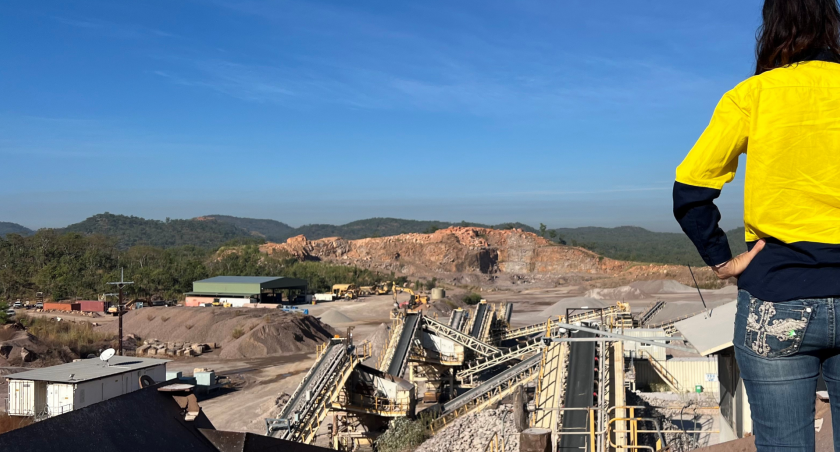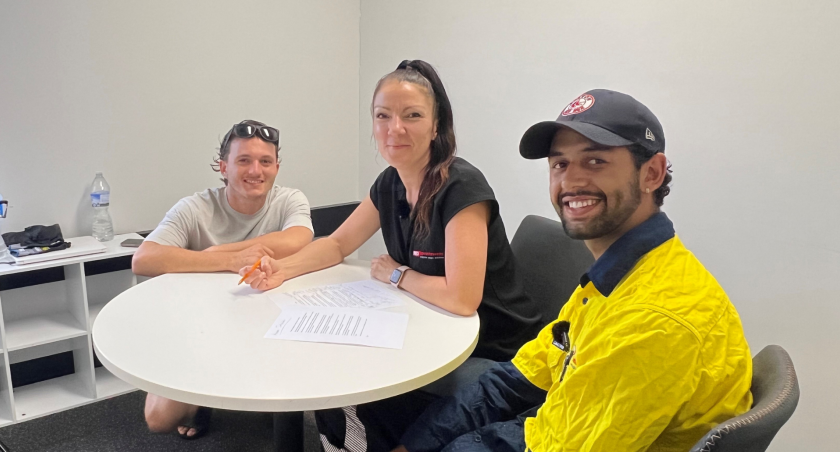Australia is a land of opportunity, especially for international backpackers looking to explore and work in a new environment. Backpackers find the experience both exciting and challenging, particularly when seeking employment in Australia's thriving civil sector.
Here, we delve into the key factors backpackers have previously faced for those eager to secure their spot in the Australian workforce to consider.

Key Challenges for International Backpackers in the Civil Sector
Language Barrier: One of the foremost hurdles for international backpackers is the language barrier. Despite many learning English in school, many nationals find their conversational skills limited when they arrive in Australia. In the civil sector, effective communication is crucial for safety and efficiency on site, making this a significant challenge.
Lack of Experience and Skills: Many international backpackers come with backgrounds in hospitality or other sectors not directly related to construction. Even those with general construction experience may find themselves lacking specific skills or certifications, such as machinery operation tickets required for many civil sector roles.
Transportation Issues: While public transport can suffice in large cities, it’s a different story in more remote areas. Many construction sites are inaccessible by public transport or start early in the morning, making personal transport almost essential.
What Employers Look for in the Civil Sector
Australian employers in the civil sector typically seek candidates with a few key qualifications and attributes including:
- White Card: This is the baseline requirement for any construction job in Australia. Without it, securing employment in the civil sector is almost impossible.
- Relevant Experience: Experience in civil projects, such as roadworks or subdivisions, is highly valued. Skills in mixing, pouring, and spreading concrete or gravel, and site preparation for installations, are essential.
- Attitude: Being proactive and showing a strong work ethic can significantly enhance one's chances of success. Dedication, hard work, and a willingness to learn and adapt can lead to ongoing rewarding opportunities.
- Machinery Operation Tickets: Holding valid Australian machinery operation tickets, like those for excavators or rollers, significantly enhances a candidate’s employability.
- Physical Fitness and Stamina: The civil sector demands long hours of outdoor work, often in challenging conditions. Employers look for individuals who are physically fit and can endure these demands.

Navigating Cultural and Language Barriers
Language and cultural differences can be significant obstacles during the job application process. The key is to improve English proficiency as much as possible and immerse oneself in the local culture.
Current Job Market Trends
The Australian construction industry is booming, providing numerous opportunities for backpackers. In regions like Darwin NT, construction jobs are abundant and often qualify towards the second-year visa requirement, attracting many international workers. However, increased competition means that non-english speakers and those with less experience might need to strive harder to stand out.
Networking and Building Connections
Networking is vital for job seekers. Utilising social media platforms like Facebook to join relevant local groups and forums can provide valuable leads. Attending community events, connecting with recruitment agencies, and even socialising in local pubs or sporting groups can also open doors.
Opportunities Within the Civil Sector
International backpackers often find roles as civil labourers or, less commonly, as machine operators if they hold the necessary tickets. While entry-level positions are available, they are rare, and competition is fierce.
Importance of Qualifications and Certifications
Possessing the right qualifications and certifications is crucial. Employers generally require candidates to meet specific criteria, such as holding an Excavator RII ticket for operator positions. Backpackers should focus on roles that align with their skills and experiences to increase their chances of success.
Common Misconceptions About Working in Australia
Many backpackers believe finding a job in Australia will be easy. However, the reality is that competition is fierce, and finding a job that matches one’s skills and experience can be challenging. It’s essential to apply for roles that align with your background and to understand the market dynamics, including the seasonal nature of some regions.
Exploring Australian Cuisine
While Australian cuisine is generally familiar to European tastes, backpackers might be surprised to find exotic options like kangaroo or crocodile on menus. Exploring local markets, especially in multicultural or rural areas, can provide a delightful culinary adventure.
We interviewed our very own NT based Recruitment Manager Aurore Bayle, who was a French backpacker herself 17 years ago. Aurore has seen firsthand some of the challenges foreigners may encounter, particularly when English is not their first language. Here’s what Aurore had to say:

Unfortunately for my fellow Frenchie’s, they have quite a few challenges to face when looking for work especially in the civil sector, the main one being the language barrier. Most French people only learn English at school but never get to practice it in everyday life, so the level of English the French know is very basic. Non-native speakers must have a good command of English for safety comprehension and effective communication on site so it can sometimes be an obstacle to them finding work.
The second challenge would be the lack of experience / lack of skills. A lot of French nationals come from either a Hospitality background, or no relevant experience in construction. The ones that do usually come from general construction but have not worked on civil construction sites before. Most backpackers also generally do not hold machinery tickets in Australia so the positions they can apply for are usually limited to general labouring.
The next one is not necessarily a challenge just for the French but for backpackers in general and it is not having their own transport. It is not an issue in large cities as such as they can rely on public transport, but in places like Darwin, having your own car is a must as a lot of the construction sites are not accessible by public transport or start too early in the morning when public transport has not yet started.
Lastly, competition can be a challenge. Darwin sees a lot of Irish nationals’ example who not only have English as their first language but also often have worked on major civil projects back home and in large Australia
Most employers in the civil sector are looking for candidates that can hit the ground running so they want workers who have previously worked on civil projects like roads, freeways, subdivisions etc. The most important thing to have is a White Card. You will not be able to find work in Construction in Australia and especially civil construction sites without one.
Some favourable skills include;
Mixing, pouring and spreading gravel and concrete.
Being able to dig holes and prepare sites for installation of pipes, drains and other fixtures.
Machinery tickets.
Operations such as rollers or excavators is highly desirable too.
Candidates are required to be physically fit and be prepared to work long hours outdoors which in places like Darwin / NT can be challenging at times due to the heat.
Australia’s construction industry is booming, offering a wealth of opportunities for backpackers and Working Holiday Visa holders. Working in the construction industry has many advantages in Australia. Whether you’re in the large city or the countryside / rural areas, construction jobs are plentiful, diverse, and well-paying. In Darwin and the NT, they even count towards the second-Year visa which is why so many backpackers come to the NT during the dry season and when the weather is not as appealing in other parts of the country.
The only issue is that there might be more job seekers than job opportunities causing a fiercer competition got the ones with less experience or non-native speakers.
These days, one cannot go past the social platforms. On Facebook alone, there are plenty of different groups, forums and community pages for job seekers, construction workers, and even for different nationalities to help each other.
Turning up in person is always highly regarded and proved effort.
Go to community or trade events, reach out to recruitment agencies like RED Appointments, or even go to businesses in person with your resume.
Finally, the pub is always a good place to network too as a lot of workers and bosses go there after work for knock off drinks.
We've placed majority of our international backpackers in roles including Civil Labourers and Machine Operators (providing they have the appropriate tickets).
Possessing the relevant qualifications or certifications when applying for jobs in the Civil Sector in Australia It is key to finding suitable employment as most employers will not even consider your application without it. Also, when applying for work, make sure you read the positions description carefully as well and the selection criteria.
There is no point applying for an Excavator Operator position if you do not have your Excavator RII ticket and / or experience. Instead look at your past experienced, skills and strengths and apply for positions that match them and that you can back up.
It is possible to find entry level positions, but it is quite rare.
One of our candidates in Darwin started as a labourer with no previous experience but his hard work and dedication got him noticed and he slowly made his way up. He proved how to operate machinery and ended up passing his tickets. He is now working full time in the mines as an Excavator Operator. There are plenty more examples just like him.
International backpackers usually have a reputation of being reliable and hard workers because they want to work long hours to get their second or third visa so use that to your advantage.
For International non-English speakers, place yourselves in situations that will help improve your English. Staying in groups with people from the same nationality is not going to help breaking the language barrier.
One of the most common misconceptions is that it will be easy to find a job here in Australia. There may be plenty of work out there but it doesn't mean it will be easy to get onboarded overnight.
If you do not have the skills or experience that employers look for when applying for certain positions, you might struggle to find anything at all and get discouraged.
That’s why it is important to apply for positions that suit your skills and experience. You cannot expect to find work as a Machine Operator if you have been a waitress for most of your working life.
It would be beneficial to study the market and also pay attention to the seasons when deciding where to go looking for work next as a lot of places in Australia are seasonal.
All those factors need to be taken into consideration.
Opportunities are unfortunately more limited for international backpackers looking to do their 88 days as only regional areas and certain job positions count (farm work, hospitality, construction etc).
Australian food is not so much different to European foods or any Western type foods. International backpackers could get surprised with specific foods like kangaroo or crocodiles being on the menu.
The best way to enjoy an array of foods would be to go to all the different markets. Darwin for example is very multi-cultural and we have foods from all around the world.
Because I have been asked before, please note there are no Roadkill Cafes, and trucks do not sell dead animals found on the side of the road haha.

